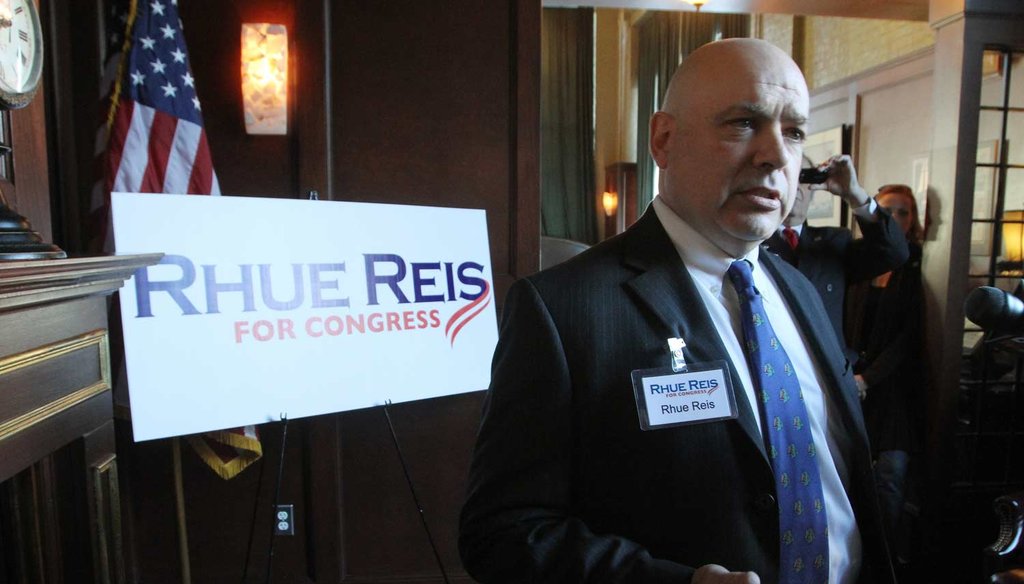

Our only agenda is to publish the truth so you can be an informed participant in democracy.
We need your help.


Republican Rhue Reis announces his candidacy for Congress in the 2nd District. Providence Journal/Bob Breidenbach
During a recent broadcast of "State of the State," a Rhode Island public access TV show, the subject of homeless veterans came up, in a round about sort of way.
The show, which aired Sept. 7, 2014, featured a debate between U.S. Rep. James Langevin, a Democrat, and Rhue Reis, the Republican who would like to replace him. The two were talking about what to do about the children coming across the U.S.-Mexico border.
Reis said they should be sent back to their respective countries because the United States has too many problems of its own.
"It needs to stop for their safety and because we cannot handle the influx. We have a much more difficult time taking care of our own," he said. "When you have 200,000 to 400,000 military veterans on the street in this country on any given day, we can't take care of them and yet we want to bring in another influx of tens or hundreds of thousands of people, illegal immigrants? We can't even take care of our own."
We wondered whether Reis was correct about the number of homeless veterans.
When we asked him for his source, Reis referred us to a web page from the National Coalition for the Homeless, which featured a fact sheet written in 2009. It pegs the count at 130,000 to 200,000 per night -- substantially less than Reis’s 200,000 to 400,000 number.
.As we searched for more information, we found several different and equally dated estimates from other advocacy groups for veterans and the homeless, some lower, some higher
For example, in 2007, the National Alliance to End Homelessness and the Homelessness Research Institute used data from the U.S. Census Bureau and U.S. Department of Veterans Affairs to estimate the numbers at 192,000 in 2004, 194,254 in 2005 and 195,827 in 2006.
But that same group now says the nightly number of veterans who are homeless is just under 50,000. That’s far lower than Reis’ number.
Why the dramatic drop?
It turns out that the newest numbers come from the U.s. Department of Veterans Affairs, the U.S. Department of Housing and Urban Development and the U.S. Interagency Council on Homelessness.
Since January 2009, they've conducted an annual "Point-in-Time Count" of the homeless who spend the night in shelters or are on the street. It's done by groups that regularly work with the homeless and who have become very good at tracking them down.
"The bottom line is, until 2009 we didn't have accurate counts for veteran homelessness," said Emanuel Cavallaro, spokesman for the National Alliance. Before direct counting was done, and the people doing the counting became adept at identifying whether a homeless person was a veteran, the estimate was done by the VA. "That [VA] data was very problematic and wasn't very reliable."
So while the VA was estimating 131,000 homeless veterans per night in 2009, the point-in-time census of the homeless put the number at 75,609. It rose to 76,329 the following year in the midst of the Great Recession and has been declining ever since, according to the point-in-time counts. The count for January 2014: 49,933.
The number has been declining, said HUD spokesman Patrick Rodenbush, because there has been a concerted effort in recent years by the Obama administration and Congress to get housing for homeless veterans. "In an era of budget cuts, this is one area where Congress has been fully funding the president's requests," he said. "This gets bipartisan support."
Our ruling
Rhue Reis said, "You have 200,000 to 400,000 military veterans on the street in this country on any given day."
Reis inaccurately cited a 2009 study, which said the number at that time wasn’t more than 200,000. The latest, best data suggests that the current number is closer to 50,000.
Homelessness among veterans is a serious problem, but the numbers are much lower than Reiss claimed.
We rate his statement False.
(If you have a claim you’d like PolitiFact Rhode Island to check, email us at [email protected]. And follow us on Twitter: @politifactri.)
Vimeo.com, "8-28-2014 DEBATE for US Congress D1: Langevin vs. Reis," John Carlevale channel, accessed Sept. 11, 2014
Interview and email, Rhue Reis, candidate for U.S. Congress in District 2, Sept. 11-12, 2014
Interview, Emanuel Cavallaro, spokesman, National Alliance to End Homelessness, Sept. 12, 2014
Interview and email, Patrick Rodenbush, spokesman, U.S. Department of Housing and Urban Development, Sept. 12, 2014
HUDexchange.info, "The 2013 Annual Homeless Assessment Report (AHAR) to Congress; Part 1 -- Point-in-Time Estimates of Homelessness;" U.S. Department of Housing and Urban Development, Office of Community Planning and Development, accessed Sept. 11, 2014
HUD.gov, "HUD, VA and USICH Announce 33% Drop in Veteran Homelessness Since 2010," Aug. 26, 2014, accessed Sept. 11, 2014
NationalHomeless.org, "Homeless Veterans," National Coalition for the Homeless, September 2009, accessed Sept. 11, 2014
Samhsa.gov, "Vital Mission: Ending Homelessness Among Veterans," National Alliance to End Homelessness and the Homeless Research Institute, November 2007, accessed Sept. 11, 2014
VeteransInc.org, "Statistics," undated, accessed Sept. 11, 2014
NCHV.org, "Background & Statistics," National Coalition for Homeless Veterans, undated, accessed Sept. 11, 2014
EndHomelessness.org, "Veterans," undated, accessed Sept. 11, 2014
In a world of wild talk and fake news, help us stand up for the facts.
